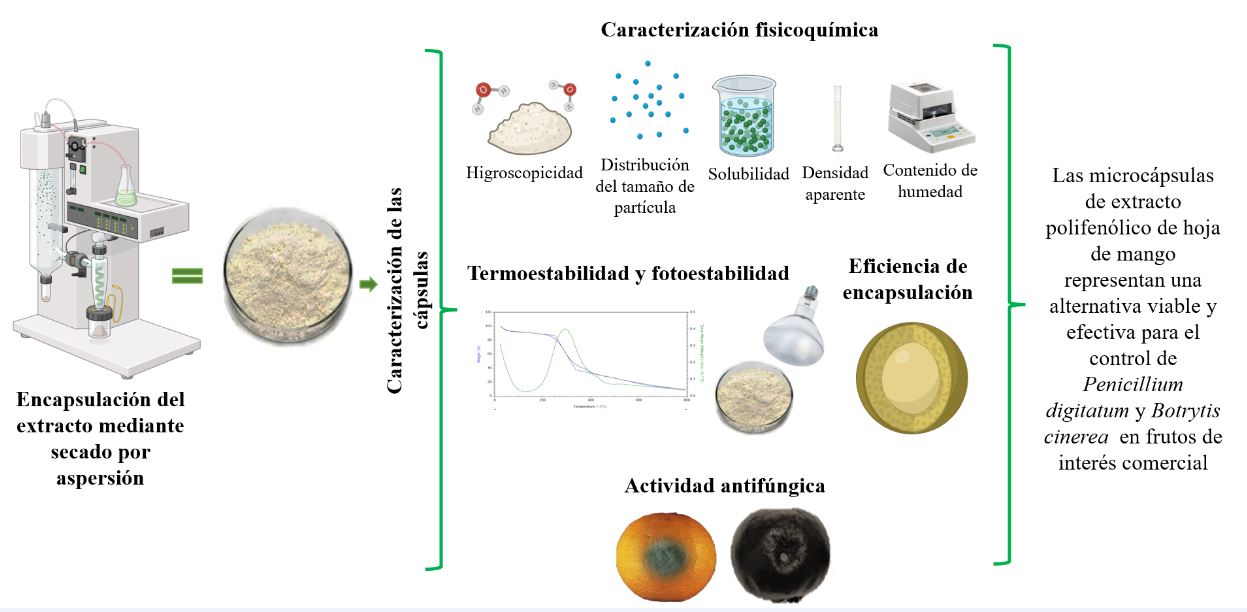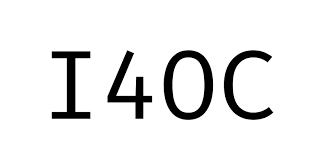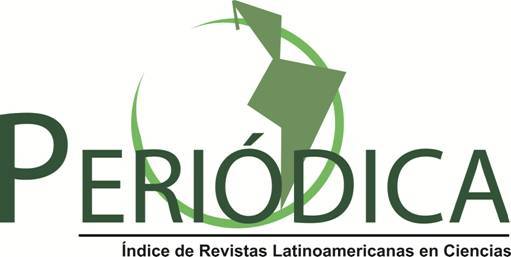Extracto polifenólico de hojas de mango (Mangifera indica L.): Microencapsulación, caracterización fisicoquímica y actividad antifúngica in vivo
DOI:
https://doi.org/10.18633/biotecnia.v26.2439Palabras clave:
Microencapsulados, polifenoles, fotoestabilidad, termoestabilidad, fitopatógenoResumen
El objetivo de este estudio fue proteger un extracto de hojas de mango rico en polifenoles mediante la microencapsulación por secado por aspersión para conservar su actividad antifúngica in vivo. Se preparó una disolución polimérica (DP) de goma arábiga y alginato de sodio; adicionada con extracto de hoja de mango. Se evaluó la temperatura de transición vítrea de la DP y se procesó en un secador por aspersión. A las cápsulas se le evaluaron parámetros fisicoquímicos, fotoestabilidad, termoestabilidad, FTIR y actividad antifúngica in vivo frente a Penicillium digitatum en naranjas y Botrytis cinerea en arándanos. Los parámetros fisicoquímicos de los encapsulados fueron adecuados para un polvo obtenido mediante secado por aspersión. El análisis FTIR evidenció la presencia del extracto en las cápsulas y la ausencia de interacciones fuertes del extracto con los biopolímeros. El extracto microencapsulado mostró alta estabilidad a la temperatura y a la radiación UV. Las cápsulas demostraron buena actividad antifúngica reduciendo la severidad de P. digitatum en un 70 % y la incidencia de B. cinerea en un 100 %. Las cápsulas presentaron características deseables que les permite proteger los polifenoles, adicionalmente, al ser altamente solubles liberan los compuestos sobre el epicarpio de los frutos, lo que representa una alternativa natural para la conservación de frutos.
Descargas
Citas
Adelaja, O.A., Bankole, A.C., Oladipo, M.E. y Lene, D. B. 2019. Biosorption of Hg (II) ions, Congo red and their binary mixture using raw and chemically activated mango leaves. International Journal of Energy and Water Resources 3(1): 1–12. https://doi.org/10.1007/s42108-019-00012-0
Aghbashlo, M., Mobli, H., Madadlou, A.Y Rafiee, S. 2013. Influence of wall material and inlet drying air temperature on the microencapsulation of fish oil by spray drying. Food and Bioprocess Tech-nology. 6(6): 1561–1569. https://doi.org/10.1007/s11947-012-0796-7
Albuquerque, B.R., Heleno, S.A., Oliveira, M.B.P.P., Barros, L. y Ferreira, I.C.F.R. 2021. Phenolic compounds: Current industrial applications, limitations and future challenges. Food & Function. 12(1): 14–29. https://doi.org/10.1039/D0FO02324H
Al-Maqtari, Q.A., Mohammed, J.K., Mahdi, A.A., Al-Ansi, W., Zhang, M., Al-Adeeb, A., Wei, M., Phyo, H.M. y Yao, W. 2021. Physicochemical properties, microstructure, and storage stability of Pulicaria jaubertii extract microencapsulated with different protein biopolymers and gum arabic as wall materials. International Journal of Biological Macromolecules. 187: 939–954. https://doi.org/10.1016/j.ijbiomac.2021.07.180
Arepally, D., Reddy, R.S., y Goswami, T.K. 2020. Studies on survivability, storage stability of encapsu-lated spray dried probiotic powder. In Current Research in Food Science 3: 235–242. https://doi.org/10.1016/j.crfs.2020.09.001
Ayón-Macías, K.D., Castañeda-Andrade, A.J., Ragazzo-Sánchez, J.A. y Calderón-Santoyo, M. 2023. Application of nanofibers with jackfruit leaf extract via electrospinning to control phytopathogens in Averrhoa carambola L. Polymer Bulletin. https://doi.org/10.1007/s00289-023-04815-4
Ballesteros, L.F., Ramirez, M.J., Orrego, C.E., Teixeira, J.A. y Mussatto, S.I. 2017. Encapsulation of antioxidant phenolic compounds extracted from spent coffee grounds by freeze-drying and spray-drying using different coating materials. Food Chemistry. 237: 623–631. https://doi.org/10.1016/j.foodchem.2017.05.142
Ballini, R. y Petrini, M. 2004. Recent synthetic developments in the nitro to carbonyl conversion (Nef reaction). Tetrahedron. 60(5): 1017–1047. https://doi.org/10.1016/j.tet.2003.11.016
Bello, O.S., Bello, O.U. y Lateef, I.O. 2014. Adsorption characteristics of mango leaf (Mangifera indica) powder as adsorbent for malachite green dye removal from aqueous solution. Covenant Journal of Physical and Life Sciences 2(1).
Bhattachar, S.N., Deschenes, L.A. y Wesley, J.A. 2006. Solubility: it’s not just for physical chemists. Drug Discovery Today. 11(21–22): 1012–1018. https://doi.org/10.1016/j.drudis.2006.09.002
Calderón‐Santoyo, M., González‐Cruz, E.M., Iñiguez‐Moreno, M., Ramos‐Martínez, O., Burgos‐Hernández, A. y Ragazzo‐Sánchez, J.A. 2022. Microencapsulation of phenolic extract from sea grape (Coccoloba uvifera L.) with antimutagenic activity. Chemistry & Biodiversity. 19(11). https://doi.org/10.1002/cbdv.202200806
Chaumun, M., Goëlo, V., Ribeiro, A.M., Rocha, F. y Estevinho, B.N. 2020. In vitro evaluation of mi-croparticles with Laurus nobilis L. extract prepared by spray-drying for application in food and pharmaceutical products. Food and Bioproducts Processing. 122: 124–135. https://doi.org/10.1016/j.fbp.2020.04.011
Chegini, G.R. y Ghobadian, B. 2005. Effect of spray-drying conditions on physical properties of orange juice powder. Drying Technology. 23(3): 657–668. https://doi.org/10.1081/DRT-200054161
Chew, S.C., Tan, C.P. y Nyam, K.L. 2018. Microencapsulation of refined kenaf (Hibiscus cannabinus L.) seed oil by spray drying using β-cyclodextrin/gum arabic/sodium caseinate. Journal of Food Engi-neering. 237: 78–85. https://doi.org/10.1016/j.jfoodeng.2018.05.016
Chiou, D. y Langrish, T.A.G. 2007. Crystallization of amorphous components in spray-dried powders. Drying Technology. 25(9): 1427–1435. https://doi.org/10.1080/07373930701536718
Díaz-Montes, E. 2023. Wall materials for encapsulating bioactive compounds via spray-drying: A review. Polymers. 15(12): 2659. https://doi.org/10.3390/polym15122659
Dierings de Souza, E.J., Kringel, D.H., Guerra Dias, A.R. y da Rosa Zavareze, E. 2021. Polysaccharides as wall material for the encapsulation of essential oils by electrospun technique. Carbohydrate Poly-mers. 265: 118068. https://doi.org/10.1016/j.carbpol.2021.118068
Felton, L.A. 2013. Mechanisms of polymeric film formation. International Journal of Pharmaceutics. 457(2): 423–427. https://doi.org/10.1016/j.ijpharm.2012.12.027
Ferrari, C.C., Marconi Germer, S.P., Alvim, I.D. y de Aguirre, J.M. 2013. Storage stability of spray-dried blackberry powder produced with maltodextrin or gum arabic. Drying Technology. 31(4): 470–478. https://doi.org/10.1080/07373937.2012.742103
Fujimori, M., Kadota, K., Kato, K., Seto, Y., Onoue, S., Sato, H., Ueda, H. y Tozuka, Y. 2016. Low hygroscopic spray-dried powders with trans-glycosylated food additives enhance the solubility and oral bioavailability of ipriflavone. Food Chemistry. 190: 1050–1055. https://doi.org/10.1016/j.foodchem.2015.06.081
Gatto, M.A., Ippolito, A., Linsalata, V., Cascarano, N.A., Nigro, F., Vanadia, S. y Di Venere, D. 2011. Activity of extracts from wild edible herbs against postharvest fungal diseases of fruit and vegetables. Postharvest Biology and Technology. 61(1): 72–82. https://doi.org/10.1016/j.postharvbio.2011.02.005
George, T.T., Oyenihi, A.B., Rautenbach, F. y Obilana, A.O. 2021. Characterization of Moringa oleifera leaf powder extract encapsulated in maltodextrin and/or gum arabic coatings. Foods. 10(12): 3044. https://doi.org/10.3390/foods10123044
González, E., Gómez-Caravaca, A.M., Giménez, B., Cebrián, R., Maqueda, M., Martínez-Férez, A., Segura-Carretero, A. y Robert, P. 2019. Evolution of the phenolic compounds profile of olive leaf extract encapsulated by spray-drying during in vitro gastrointestinal digestion. Food Chemistry. 279: 40–48. https://doi.org/10.1016/j.foodchem.2018.11.127
Guamán-Balcázar, M.C., Montes, A., Pereyra, C. y de la Ossa, E.M. 2017. Precipitation of mango leaves antioxidants by supercritical antisolvent process. Journal of Supercritical Fluids, 128: 218–226. https://doi.org/10.1016/j.supflu.2017.05.031
Hernández, A., Ruiz-Moyano, S., Galván, A.I., Merchán, A.V., Pérez Nevado, F., Aranda, E., Serradilla, M.J., Córdoba, M. de G. y Martín, A. 2021. Anti-fungal activity of phenolic sweet orange peel ex-tract for controlling fungi responsible for post-harvest fruit decay. Fungal Biology. 125(2): 143–152. https://doi.org/10.1016/j.funbio.2020.05.005
Iñiguez-Moreno, M., Ragazzo-Sánchez, J.A., Barros-Castillo, J.C., Solís-Pacheco, J.R. y Calderón-Santoyo, M. 2021. Characterization of sodium alginate coatings with Meyerozyma carib-bica and impact on quality properties of avocado fruit. Lwt- Food Science and Technology. 152: 112346. https://doi.org/10.1016/j.lwt.2021.112346
Ionashiro, E.Y., Caires, F.J., Siqueira, A.B., Lima, L.S. y Carvalho, C.T. 2012. Thermal behaviour of fumaric acid, sodium fumarate and its compounds with light trivalent lanthanides in air atmosphere. Journal of Thermal Analysis and Calorimetry. 108(3): 1183–1188. https://doi.org/10.1007/s10973-011-1660-0
Islam, M.I.U., Sherrell, R. y Langrish, T.A.G. 2010. An investigation of the relationship between glass transition temperatures and the crystallinity of spray-dried powders. Drying Technology. 28(3): 361–368. https://doi.org/10.1080/07373931003641586
Jimenez-Sánchez, D.E., Calderón-Santoyo, M., Herman-Lara, E., Gaston-Peña, C., Luna-Solano, G. y Ragazzo-Sánchez, J.A. 2020. Use of native agave fructans as stabilizers on physicochemical proper-ties of spray-dried pineapple juice. Drying Technology. 38(3): 293–303. https://doi.org/10.1080/07373937.2019.1565575
Jimenez-Sánchez, D.E., Calderón-Santoyo, M., Picart-Palmade, L., Luna-Solano, G., Ortiz-Basurto, R.I., Bautista-Rosales, P.U. y Ragazzo-Sánchez, J.A. 2017. Effect of addition of native agave fructans on spray-dried chayote (Sechium edule) and pineapple (Ananas comosus) juices: Rheology, micro-structure, and water sorption. Food and Bioprocess Technology. 10(11): 2069–2080. https://doi.org/10.1007/s11947-017-1974-4
Juarez-Enriquez, E., Olivas, G.I., Zamudio-Flores, P.B., Ortega-Rivas, E., Perez-Vega, S. y Sepulveda, D.R. 2017. Effect of water content on the flowability of hygroscopic powders. Journal of Food En-gineering. 205: 12–17. https://doi.org/10.1016/j.jfoodeng.2017.02.024
Karagozlu, M., Ocak, B. y Özdestan-Ocak, Ö. 2021. Effect of tannic acid concentration on the physico-chemical, thermal, and antioxidant properties of gelatin/gum arabic–walled microcapsules containing Origanum onites L. essential Oil. Food and Bioprocess Technology. 14(7): 1231–1243. https://doi.org/10.1007/s11947-021-02633-y
Karrar, E., Mahdi, A.A., Sheth, S., Mohamed-Ahmed, I.A., Manzoor, M.F., Wei, W. y Wang, X. 2021. Effect of maltodextrin combination with gum arabic and whey protein isolate on the microencapsula-tion of gurum seed oil using a spray-drying method. International Journal of Biological Macromole-cules. 171: 208–216. https://doi.org/10.1016/j.ijbiomac.2020.12.045
Kuck, L.S., Wesolowski, J.L. y Noreña, C.P.Z. 2017. Effect of temperature and relative humidity on sta-bility following simulated gastro-intestinal digestion of microcapsules of Bordo grape skin phenolic extract produced with different carrier agents. Food Chemistry. 230: 257–264. https://doi.org/10.1016/j.foodchem.2017.03.038
Kumar, M., Saurabh, V., Tomar, M., Hasan, M., Changan, S., Sasi, M., Maheshwari, C., Prajapati, U., Singh, S., Prajapat, R.K., Dhumal, S., Punia, S., Amarowicz, R. y Mekhemar, M. 2021. Mango (Mangifera indica L.) leaves: Nutritional composition, phytochemical profile, and health-promoting bioactivities. Antioxidants. 10(2): 299. https://doi.org/10.3390/antiox10020299
Li, J., Zhai, J., Dyett, B., Yang, Y., Drummond, C.J. y Conn, C.E. 2021. Effect of gum arabic or sodium alginate incorporation on the physicochemical and curcumin retention properties of liposomes. Lwt- Food Science and Technology. 139: 110571. https://doi.org/10.1016/j.lwt.2020.110571
Liudvinaviciute, D., Rutkaite, R., Bendoraitiene, J. y Klimaviciute, R. 2019. Thermogravimetric analysis of caffeic and rosmarinic acid containing chitosan complexes. Carbohydrate Polymers. 222: 115003. https://doi.org/10.1016/j.carbpol.2019.115003
Ma, L., He, J., Liu, H. y Zhou, H. 2018. The phenylpropanoid pathway affects apple fruit resistance to Botrytis cinerea. Journal of Phytopathology. 166(3): 206–215. https://doi.org/10.1111/jph.12677
Morales, J., Mendoza, L. y Cotoras, M. 2017. Alteration of oxidative phosphorylation as a possible mechanism of the antifungal action of coumaric acid against Botrytis cinerea. Journal of Applied Microbiology. 123(4): 969–976. https://doi.org/10.1111/jam.13540
Macías-Cortés, E., Gallegos-Infante, J., Rocha-Guzmán, N., Moreno-Jiménez, M., Medina-Torres, L. y González-Laredo, R.F. 2020. Microencapsulation of phenolic compounds: Technologies and novel polymers. Revista Mexicana de Ingeniería Química. 19(2): 491–521. https://doi.org/10.24275/rmiq
Nair, R.M., Bindhu, B. y Reena, V.L. 2020. A polymer blend from gum arabic and sodium alginate - preparation and characterization. Journal of Polymer Research. 27(6): 154. https://doi.org/10.1007/s10965-020-02128-y
Navarro-Flores, M.J., Ventura-Canseco, L.M.C., Meza-Gordillo, R., Ayora-Talavera, T. del R. y Abud-Archila, M. 2020. Spray drying encapsulation of a native plant extract rich in phenolic com-pounds with combinations of maltodextrin and non-conventional wall materials. Journal of Food Science and Technology. 57(11): 4111–4122. https://doi.org/10.1007/s13197-020-04447-w
Nedović, V., Kalušević, A., Manojlović, V., Petrović, T. y Bugarski, B. 2013. Encapsulation systems in the food industry. En Food Engineering Series. V. Nedović., A. Kaluševic., V. Manojlović., T. Pe-trović y B. Bugarski (ed.), pp 229–253. Springer. https://doi.org/10.1007/978-1-4614-7906-2_13
Owusu-Ware, S.K., Chowdhry, B.Z., Leharne, S.A. y Antonijević, M.D. 2013. Quantitative analysis of overlapping processes in the non-isothermal decomposition of chlorogenic acid by peak fitting. Thermochimica Acta. 565: 27–33. https://doi.org/10.1016/j.tca.2013.04.029
Pérez-Alfonso, C.O., Martínez-Romero, D., Zapata, P.J., Serrano, M., Valero, D. y Castillo, S. 2012. The effects of essential oils carvacrol and thymol on growth of Penicillium digitatum and P. italicum involved in lemon decay. International Journal of Food Microbiology. 158(2): 101–106. https://doi.org/10.1016/j.ijfoodmicro.2012.07.002
Ramos-Hernández, J., Ragazzo-Sánchez, J.A., Calderón-Santoyo, M., Ortiz-Basurto, R., Prieto, C. y Lagaron, J. 2018. Use of electrosprayed agave fructans as nanoencapsulating hydrocolloids for bio-actives. Nanomaterials. 8(11): 868. https://doi.org/10.3390/nano8110868
Rao, A., Zhang, Y., Muend, S. y Rao, R. 2010. Mechanism of antifungal activity of terpenoid phenols resembles calcium stress and inhibition of the TOR Pathway. Antimicrobial Agents and Chemother-apy. 54(12): 5062–5069. https://doi.org/10.1128/AAC.01050-10
Ribeiro, A.M., Estevinho, B.N. y Rocha, F. 2019. Spray drying encapsulation of elderberry extract and evaluating the release and stability of phenolic compounds in encapsulated powders. Food and Bio-process Technology. 12(8): 1381–1394. https://doi.org/10.1007/s11947-019-02304-z
Rodríguez‐Ramírez, J., Méndez‐Lagunas, L., López‐Ortiz, A. y Torres, S.S. 2012. True density and ap-parent density during the drying process for vegetables and fruits: A review. Journal of Food Sci-ence. 77(12): R146–R154. https://doi.org/10.1111/j.1750-3841.2012.02990.x
Romeo, F., Ballistreri, G., Fabroni, S., Pangallo, S., Nicosia, M., Schena, L. y Rapisarda, P. 2015. Chemical characterization of different sumac and pomegranate extracts effective against Botrytis ci-nerea rots. Molecules. 20(7): 11941–11958. https://doi.org/10.3390/molecules200711941
Ruiz-Montañez, G., Calderón-Santoyo, M., Chevalier-Lucia, D., Picart-Palmade, L., Jiménez-Sánchez, D.E. y Ragazzo-Sánchez, J.A. 2019. Ultrasound-assisted microencapsulation of jackfruit extract in eco-friendly powder particles: Characterization and antiproliferative activity. Journal of Dispersion Science and Technology. 40(10): 1507–1515. https://doi.org/10.1080/01932691.2019.1566923
Rzokee, A.A. y Ahmad, A. 2014. Synthesis, spectroscopic studies and thermal analysis of charge-transfer complex of 2,2′-bipyridine with 4-hydroxybenzoic acid in different polar solvents. Journal of Molecular Structure. 1076: 453–460. https://doi.org/10.1016/j.molstruc.2014.08.002
Safeer-Abbas, M., Afzaal, M., Saeed, F., Asghar, A., Jianfeng, L., Ahmad, A., Ullah, Q., Elahi, S., Ateeq, H., Shah, Y.A., Nouman, M. y Shah, M.A. 2023. Probiotic viability as affected by encapsu-lation materials: Recent updates and perspectives. International Journal of Food Properties. 26(1): 1324–1350. https://doi.org/10.1080/10942912.2023.2213408
Santiago, R., Blanch, M., Vicente, C. y Legaz, M.E. 2010. In vitro effects of caffeic acid upon growth of the fungi Sporisorium scitamineum. Journal of Plant Interactions. 5(3): 233–240. https://doi.org/10.1080/17429141003663860
Sarabandi, K., Jafari, S.M., Mahoonak, A.S. y Mohammadi, A. 2019. Application of gum arabic and maltodextrin for encapsulation of eggplant peel extract as a natural antioxidant and color source. In-ternational Journal of Biological Macromolecules. 140: 59–68. https://doi.org/10.1016/j.ijbiomac.2019.08.133
Savjani, K.T., Gajjar, A.K. y Savjani, J.K. 2012. Drug solubility: Importance and enhancement tech-niques. ISRN Pharmaceutics. 2012: 1–10. https://doi.org/10.5402/2012/195727
Shimanovich, U., Bernardes, G.J.L., Knowles, T.P.J. y Cavaco-Paulo, A. 2014. Protein micro- and nano-capsules for biomedical applications. Chemical Society Reviews. 43(5): 1361–1371. https://doi.org/10.1039/C3CS60376H
Stanisavljević, N., Stanisavljević, S., Šavikin, K., Kaluševićkaluševi´ Kalušević, A., Nedović, V., Ne-dović, N., Bigovićbigovi´ Bigović, D. y Janković, T.J. 2018. Application of gum arabic in the pro-duction of spray-dried chokeberry polyphenols, microparticles characterization and in vitro digestion method. Lekovite Sirovine. 38: 1-16. https://doi.org/http://dx.doi.org/10.1364/leksir1838009C
Taiwo, B.J., Miller, A.H., Fielding, A.J., Sarker, S.D., van Heerden, F.R. y Fatokun, A.A. 2024. Ceibinin, a new positional isomer of mangiferin from the inflorescence of Ceiba pentandra (Bomba-caceae), elicits similar antioxidant effect but no anti-inflammatory potential compared to mangiferin. Heliyon. 10(1): e23335. https://doi.org/10.1016/j.heliyon.2023.e23335
Tao, T., Ding, Z., Hou, D., Prakash, S., Zhao, Y., Fan, Z., Zhang, D., Wang, Z., Liu, M. y Han, J. 2019. Influence of polysaccharide as co-encapsulant on powder characteristics, survival and viability of microencapsulated Lactobacillus paracasei Lpc-37 by spray drying. Journal of Food Engineering. 252: 10–17. https://doi.org/10.1016/j.jfoodeng.2019.02.009
Tomsone, L., Galoburda, R., Kruma, Z., Durrieu, V. y Cinkmanis, I. 2020. Microencapsulation of horseradish (Armoracia rusticana L.) juice using spray-drying. Foods. 9(9): 1332. https://doi.org/10.3390/foods9091332
Tonon, R.V., Freitas, S.S. y Hubinger, M.D. 2011. Spray drying of açaí (Euterpe oleraceae mart.) juice: Effect of inlet air temperature and type of carrier agent. Journal of Food Processing and Preservation. 35(5): 691–700. https://doi.org/10.1111/j.1745-4549.2011.00518.x
Wondraczek, H., Kotiaho, A., Fardim, P. y Heinze, T. 2011. Photoactive polysaccharides. Carbohydrate Polymers. 83(3): 1048–1061. https://doi.org/10.1016/j.carbpol.2010.10.014
Yazdi, A.P.G., Barzegar, M., Sahari, M.A. y Ahmadi-Gavlighi, H. 2021. Encapsulation of pistachio green hull phenolic compounds by spray drying. Journal of Agricultural Science and Technology. 23(1): 51-64. https://doi.org/20.1001.1.16807073.2021.23.1.18.1
Zhang, C., Khoo, S.L.A., Swedlund, P., Ogawa, Y., Shan, Y. y Quek, S.Y. 2020. Fabrication of spray-dried microcapsules containing noni juice using lends of maltodextrin and gum acacia: Physi-cochemical properties of powders and bioaccessibility of bioactives during in vitro digestion. Foods. 9(9): 1316. https://doi.org/10.3390/foods9091316
Ziaee, A., Albadarin, A.B., Padrela, L., Femmer, T., O’Reilly, E. y Walker, G. 2019. Spray drying of pharmaceuticals and biopharmaceuticals: Critical parameters and experimental process optimization approaches. European Journal of Pharmaceutical Sciences. 127: 300–318. https://doi.org/10.1016/j.ejps.2018.10.026

Publicado
Cómo citar
Número
Sección
Licencia
Derechos de autor 2023

Esta obra está bajo una licencia internacional Creative Commons Atribución-NoComercial-CompartirIgual 4.0.
La revista Biotecnia se encuentra bajo la licencia Atribución-NoComercial-CompartirIgual 4.0 Internacional (CC BY-NC-SA 4.0)















_(2).jpg)








